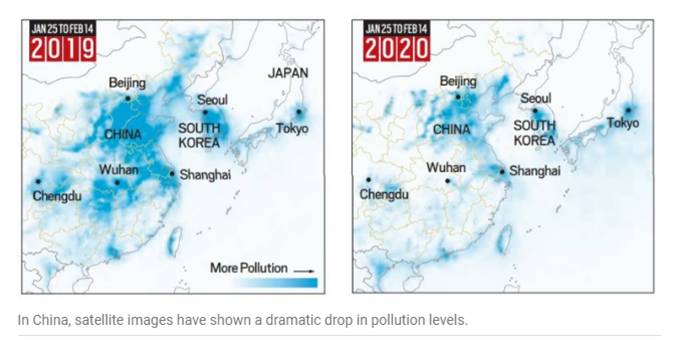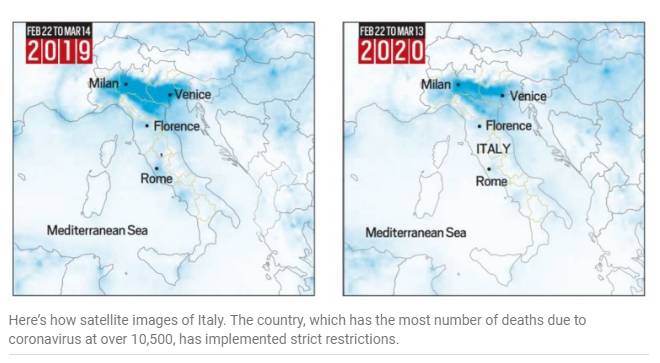Major cities in India, China, the United States, Italy, Spain, and the UK have experienced lower levels of toxic emissions and improved air quality since the coronavirus-induced lockdown.
As the number of COVID-19 patients around the world cross the 6-lakh mark, several countries have enforced lockdowns to contain the spread of the coronavirus. With India joining the list, one-third of humanity is effectively confined to their homes.
The lockdowns have caused a major disruption in the global economy, leading to the deprivation of livelihood for crores of people. Experts estimate a shrinking of the global GDP by 4 per cent — twice the amount caused by the 2008 financial crisis.
Another consequence of the halt in economic activity, however, is a notable reduction in pollution levels in several countries.
By what extent has pollution reduced due to coronavirus?
With over 300 crore people living under lockdown conditions around the world, several important sectors of the global economy have been stalled.
Transport, which makes up almost a fourth of global carbon emissions, has been badly hit due to restrictions on mobility. Both land and air travel, the major contributors to transport emissions, have been drastically affected. Other sectors, such as power generation and industrial units, have also seen a major downturn.
This has led to major cities in India, China, the United States, Italy, Spain, and the UK experiencing lower levels of toxic emissions and improved air quality.
 In India, pollution levels have dipped over major cities. New Delhi, which regularly has unhealthy air conditions, saw its AQI falling below 95 last week — a big reduction from its monthly average of 161 from March 2019. Mumbai, too, has witnessed a similar reduction in pollution.
In India, pollution levels have dipped over major cities. New Delhi, which regularly has unhealthy air conditions, saw its AQI falling below 95 last week — a big reduction from its monthly average of 161 from March 2019. Mumbai, too, has witnessed a similar reduction in pollution.
In China, satellite images have shown a dramatic drop in pollution levels. According to a BBC report, lockdown measures led to emissions falling by 25 per cent at the beginning of the year, and the proportion of “good quality air” days going up by 11.4 per cent in 337 cities.
Carbon monoxide levels in New York have gone down by 50 per cent compared with last year, according to researchers at Columbia University.
The highly industrialised Po valley in northern Italy has seen NO2 levels plummet.
What will happen to pollution levels once the lockdown is over?
According to The Economist, despite the temporary improvement, the global response to the economic crisis could make things worse for the environment.
After the 2008 financial crash, a combination of stimulus programmes for sectors such as construction, along with low prices of fossil fuels, led to rapid growth in large developing economies like India and China.
 Worldwide, as economies recovered, carbon emissions increased significantly than before the crisis.
Worldwide, as economies recovered, carbon emissions increased significantly than before the crisis.
Such a trend has been recorded after a number of calamitous events in the past, where emissions received a setback but later rebounded. The oil crises of 1973 and 1979, the fall of the USSR, and the 1997 Asian financial crisis are some of the examples when such a phenomenon occurred.
Recovery efforts post the novel coronavirus-caused crisis could lead to the same happening.
As per The Economist, the solar energy sector could be adversely affected, and enthusiasm at the COP26 UN conference, the biggest since the 2015 Paris conference, could dampen.
The effect on the environment is believed to be dependent on two factors — how long the lockdown conditions continue, and what kind of measures governments choose to support their economies.
The outcome for the environment would be less damaging if countries choose to invest in newer, climate-friendly industries, instead of relying on carbon-intensive sectors for their economic recovery, experts say.
© IE Online Media Services Pvt Ltd



